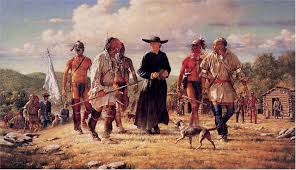Conservative Catholics have expressed suspicion that Pope Francis is importing the values of a culture influenced by secular humanism into Church theology. He has expressed concerns with regards to the treatment of the poor, women, and ethnic and religious minorities. On the 1st of January of 2015, Pope Francis began the year on the World Day of Peace by referring to St. Paul’s letter to Philemon while instructing Catholics to combat those who would maintain millions of people in “conditions akin to slavery.” St. Paul called upon Philemon to accept Onesimus, Philemon’s former slave, as a brother after Onesimus had converted to Christianity. Pope Francis noted that the buying and selling of human beings had been tolerated but is today viewed as a “crime against humanity.” Pope Francis went on to discuss the treatment of migrants, women forced into prostitution, workers laboring without labor rights, and persons forced to serve as soldiers. Throughout the message, the theme of slavery was utilized to frame current issues. While this may seem like an attempt to introduce progressive political values into the Church, I argue herein that Pope Francis stands firmly within a tradition of conversionary compassion.
Catholic compassion within the context of religious universalism is different from liberal political ideologies based on effective as opposed to merely formal rights. Catholic compassion within the context of religious universalism can raise concerns with regards to class-based issues, the treatment of women, racial discrimination and violence against religious minorities, but affirms a Catholic identity, is anti-relativistic, and can be a powerful impetus for collective action – especially conversionary action. Liberal political ideologies which reach past formal rights into the realm of effective rights seek to pursue the object of equality by dissolving gender-based, class-based, faith-based, and ethnic collective identities, including a distinct Catholic identity which may not fit into its vision for the world.
Catholic compassion can be simultaneously revolutionary and traditionalist. The Counter-Reformation, for example, is frequently depicted as a return to the past, but the result of the Council of Trent (1545-1563) was an active Church with a stronger missionary zeal. The Church began to reach out to previously isolated communities of rural peasants throughout Europe. Many of these peasants had spent the majority of their lives worshipping pagan deities despite living in nominally Christian nations. Schools and charities were opened to bring in the excluded. Often, spiritual and governmental power cooperated with each other, sharing responsibility for reshaping society. In terms of the treatment of African and indigenous peoples in colonies during the succeeding decades, the debate in Catholic circles was not over whether colonization was right or wrong. Rather, the debate was about whether non-European cultures were so different that conversion required stricter, less humane measures or could take place along the same lines that the conversion of pagans was following in Europe. The debate between Catholics in favor of slavery and against it was not a debate between liberal Catholics and conservatives, but a debate between advocates of a firm Catholic compassion within the context of religious universalism and those willing to sacrifice some elements of Catholic compassion to achieve the same ends.
A perfect example of a Jesuit critic of slavery is António Vieira, a philosopher of the Portuguese Empire. Despite the fact that he is little known in the United States, he is viewed by many European scholars as one of the greatest orators of his day. He was in favor of colonization, becoming a nationalist prophet of sorts and was convicted by the Inquisition for his heresies. The Portuguese Empire would find no greater advocate, as discussed below. Yet, the utopian nationalist ideals he embraced did not keep him from arguing for the humane treatment of conquered peoples. He believed in a Church that acted in conjunction with the King to expand the faith but also believed that power should be wielded responsibly. Examining Vieira’s life and beliefs, we can arrive at a better understanding of Catholic skepticism with regards to slavery in the seventeenth century. He makes the distinction between Catholic compassion for victims of mistreatment and liberal political ideologies based on effective equality perfectly clear.
Vieira was born to humble beginnings in Lisbon in 1608 on the aptly named Rua dos Cónegos (Street of the Canons), the first son of the scribe Cristóvão Vieira Ravasco – originally from Santarém, his mother of partial African descent – and Maria de Azevedo. He moved to the state of Bahia in Brazil at age six after his father had been sent to work as a scribe at the local court, and graduated from a regional Jesuit college. A sensitivity to slavery manifested itself in many of his sermons, perhaps because of his father’s heritage. We find a repudiation of slavery and racism in the Sermão Vigésimo (Twentieth Sermon):
Who would deny that all men are children of Adam? God made them all from one mass so that they should live united, but they divide themselves: he made them equal and they make themselves unequal: he made them brothers, but they do not value their relationship…
He went on to deny the validity of distinctions based on class and skin color. He explicitly suggested in some of his sermons that the wealthy are less likely to be blessed in the afterlife than their slaves. He observed that three racial castes coexisted in Brazil: whites, mixed persons and blacks. He observed that these groups tended to worship separately and criticized this tendency, claiming that God had built one Church for all peoples. Vieira had the courage to make such a statement amidst an economy built upon slavery and a society infused with caste distinctions.
Vieira’s statements may lead us to mistakenly conclude that he supported the ideal of effective equality and the dissolution of identity when, in fact, he is affirming a Catholic identity which does not accept relativism. As many of his other statements make clear, he believed that the Catholic identity required collective conversionary action and that the Portuguese Empire was the perfect vehicle for his religious universalism. He advocated the need for a new, global identity and, therefore, for the complete end of relativism as such. His compassion must be understood within this context because it loses meaning outside a conversionary framework.
After being ordained a priest in December of 1634, he traveled throughout Bahia, working as a missionary, but by 1642 he was residing in Lisbon, part of the Royal Court after Portuguese independence from Castile, becoming a diplomat of sorts. Vieira was thus not only a religious figure but held political office as well. Vieira believed in the Fifth Empire, the notion that his nation was destined to militarily conquer the entire world on behalf of the Church, citing the prophecies of Dominican scholar Giles of Santarém:
And after being redeemed, after Portugal being liberated, what will happen to it? Africa will be conquered. The Ottoman Empire shall fall subjected and surrendering at its feet. The sacred house of Jerusalem shall be regained. And to crown such glorious victories, the golden age shall be resuscitated
The Baroque artistic mentality – whether found in painter or preacher – is not so much to appeal to pure intellect as to the senses. Vieira frequently took two unrelated concepts and synthesized them unexpectedly, causing pleasure as the audience absorbed the beauty of the agudeza (acuity) – for instance, taking prophetic verses by poet António Gonçalves de Bandarra presaging the return of King Sebastião I after his death at the battle of Alcácer Quibir in Morocco in 1578 (a popular theme) and meshing the prediction to events occurring in Portugal during his lifetime, such as independence from Spain. The effect is to produce bewilderment from the unexpected combination of things.
Vieira argued in A História do Futuro (History of the Future) that the Old Testament prophet Isaiah was referring to the Portuguese presence in Northeastern Brazil when discussing a chosen people who had sent ambassadors to Ethiopia: “I will tell you at the outset that Isaiah refers to Brazil, because Brazil is the land directly on the opposite side of Ethiopia.” The colonization of Brazil, Vieira wrote, helped to prove that the whole world would come to bow its head before the Fifth Empire, a glorious society as important as the Assyrians, Persians, Greeks and Romans and elevating civilization to another level via global conversion to Catholicism. In 1663, Vieira was summoned before the Inquisition to be examined about his belief in these prophecies. Vieira was convicted in 1667, four years after proceedings against him had officially begun. The Inquisition ordered that he be cloistered away and prohibited from preaching. It would have been an ignominious end were the sentence and conviction not overturned in 1668 for a variety of identified deficiencies in the judgment, including possible personal, political and financial motives on the part of his inquisitors. Vieira spent time in Lisbon and Rome before returning to Bahia in 1681, where he would work as a missionary until his death in 1697. The point is that his compassion was informed by a rabid conversionary ideal.
Few theologians were less relativistic and, simultaneously, more compassionate than Vieira. Catholic thinkers who were skeptical of some of the crueler aspects of colonial expansion, like Vieira, did not believe that the Church should be a weak institution. They would never have dreamed of claiming that other faiths had just as much a claim to truth as their own. Such a belief would have implied that the measures the Church had taken to address poverty, educate, and simultaneously convert rural European peasants from their pagan faiths to Catholicism would also have been wrong because those isolated groups would have had a claim to truth as well. The issue was whether the ultimate purpose of conversion was being carried out in a manner keeping with the Church’s mission of elevating human dignity. Thus, the Spanish Dominican friar Antonio de Montesinos criticized enslavement of the native peoples of Hispaniola but did not criticize the project of conversion, and convinced the King to pass the Law of Burgos regulating some of the conduct of colonists. The Spaniard Bartolomé de las Casas, inspired by Antonio de Montesinos, also advocated for more protection of native peoples. Both Bartolomé de las Casas and Antonio de Montesinos also wrote letters indicating that their object was conversion. Like Vieira, they all believed that the Counter-Reformation project was a worthwhile one but that limits governing behavior when confronting different cultures were necessary to guarantee that the conversionary project did not become barbaric.
Pope Francis is not an adherent to Liberation Theology simply because he is a Latin American. He canonized Junípero Serra, hardly a socialistic figure embraced by Latino activists. He has never advocated Marxism, nor has he advocated political leftism or conservatism. He has never stated that all faiths possess an equal claim to truth because his compassion must be viewed in conjunction within the framework of a conversionary ideal, much like the faith possessed by Vieira, Montesinos, and las Casas. In fact, it could be argued that Pope Francis represents a return to the Counter-Reformation ideal, to a Church that believes it has solutions for the world’s ills and isn’t timid about saying so. Catholics who embrace Pope Francis’s call to combat oppression harming those who live in conditions “akin to slavery” should view such a mission as an affirmation of the Church’s claim to universal truth and understand that the ideal of conversionary compassion can strengthen our commitment to human dignity. When the Church leads by example, it strengthens its own claim to moral legitimacy.
Plinio Degoes, Esq., Ph.D. earned his doctorate from Harvard in Romance Languages & Literatures. He has a law degree from Emory Law School and a bachelor’s in political science from the University of Michigan. His research focuses on the intersection between journalism, politics and religion.










